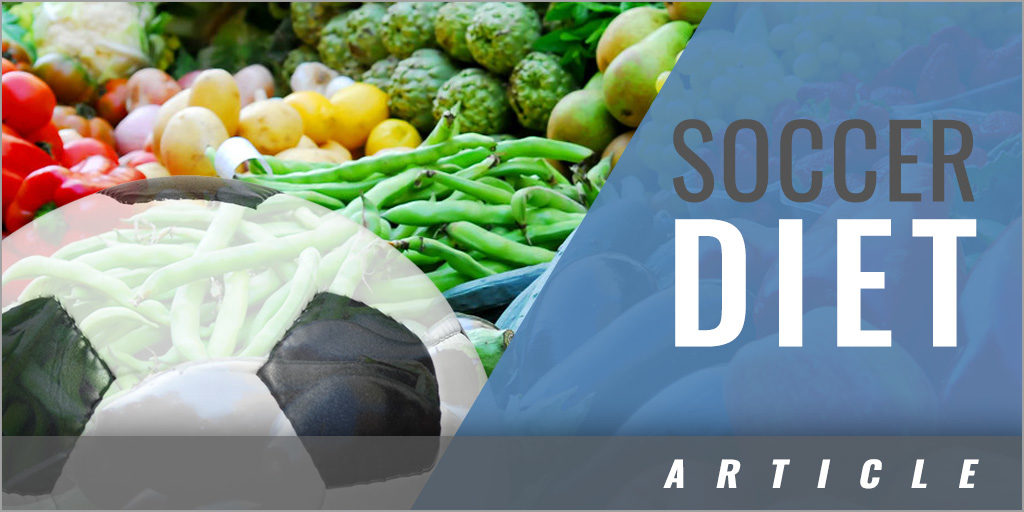|
By: Casey Ames, Head Trainer at Optimal Soccer Provided by: Amplified Soccer Besides playing soccer itself, diet is the most important aspect of a soccer player's game. It's simple, soccer demands energy from your body and what you eat decides what kind of energy you are giving your body, and what you put in your body can affect every aspect of your game. Eating correctly can improve your endurance, sleep, recovery, motivation, mood and the list goes on and on. Most players and coaches do not realize the negative effects of not taking soccer nutrition seriously. One reason for this is that it's a complicated field of knowledge with an overwhelming amount of information, and a surprising amount of it is straight up wrong. Lucky for you, I have spent years swimming through the information, reading studies and carrying out various tests to figure out what is truly the best soccer player diet looks like. Let's begin by looking at what the physical demands of soccer, and what they mean for your diet. Soccer Player Diet Plan - The Physical Demands of Soccer Soccer is a complicated sport when it comes to physical demands. As anyone who has played the game knows, you run a ton. However, do you really know the breakdown of an average soccer player's movements during a game? Here is a breakdown of an average game for an elite player:
The part that stands out about this is the average heart rate. That is really high for 90 minutes. And what these statistics don't show is the physical fighting that goes along with soccer, the intensity of having the ball at your feet and the intensity of defending someone 1v1. Soccer is extremely demanding on the body, especially when you add up all the practices along with the lifting and conditioning sessions. You need to be giving your body the nutrients that it needs. So let's take a look at what a soccer player's diet should look like. Calories and Macronutrients The most important thing for soccer players is making sure you are giving your body the fuel it needs to work every single day at high-intensity levels. The recommended number of calories a soccer player should be eating is 22-24 calories per pound of body weight. So, for most college players, this will put you in the range of 3,500 to 4,000 calories a day. If you want to maintain or gain weight, get prepared to eat. A lot. The next question is what kind of food should be making up your caloric needs. Let's look at how your 3,500 to 4,500 calorie diet should be constructed by in terms of macronutrients. Macronutrients are simply the three main sources of calories: protein, carbohydrates, and fats. These Macronutrients all provide energy in the form of calories for your body, but in different ways and with different roles. Let's take a look at each one individually. Protein Protein is the simplest macronutrient to look at, which is why I am starting with it. As a soccer player, to maintain your muscle mass you need to be eating 1 gram of protein per pound of body weight, and if you're trying to gain lean mass, then up that to 1.5 grams of protein per pound of body weight. Simple as that. You can get a more in-depth look at protein, how it works and why it's so important here, but for this article, we'll keep it easy. The best sources of protein are:
Carbohydrates Carbs! They have recently replaced fats as the "evil" macronutrient ever since that guy Atkins decided that they are the enemy. While removing a broad range of all carbohydrates together may seem like a good idea, it's not, especially when it comes to athletes. While sedentary people should be reducing their carb intake to only vegetables and some fruits, soccer players need carbohydrates to adequately fuel and replenish our glycogen storages. Our glycogen storages are what we use for explosive moments, such as sprinting, jumping, changing directions quickly, fighting for a 50/50 ball… get the point? Soccer players need carbs, but we need to be careful with how many carbohydrates and what kind of carbohydrates we are taking in. Your body only stores around 300 to 500 grams of carbs at one time. This means that before and after a day of hard work, such as a practice and lifting or a game, you need to be managing your glycogen storages through eating carbs. While this may seem like a call to action to eat whatever you want, it is not. You need to be aware of which carbs are good to be filling up on and which ones should be avoided, and unfortunately, this is a complicated issue. Luckily, I come with some science on my side. First, lets start off with where you should NOT be getting your carbs from First, lets start off with where you should NOT be getting your carbs from:
While this list cuts out most of the carbohydrates you've been eating your entire life, e.g. bread and pasta, you'll be a better soccer player once you make the change. If you haven't already noticed effects of these crappy sources for carbohydrates, then you're probably thinking to yourself right now "I don't need to make a change, I feel fine", and it's true. You probably feel fine, but is fine good enough for someone trying to reach their potential as a soccer player? Professional athletes of all sports are moving towards gluten-free diets and are not afraid to talk of the benefits. Give gluten-free a try, you'll be glad you did. Now let's get into where you should be getting your carbohydrates from:
If you didn't notice, the carbohydrate recommendations are in line with the Japanese Village-style Diet, a culture that has a history of low obesity, diabetes and most diseases that plague our Western culture. As a soccer player, you need carbohydrates, just make sure you're getting the correct ones. To dive deeper into carbohydrates, read my article dedicated to them here. Fats I am excited to discuss fats. They have been hated on for such a long time, and the mainstream media is just coming around to discerning the real benefits and issues when it comes to fats. Fortunately, nutritionists and fitness experts have been preaching the necessity of having fats in your diet for a while. The key is what types of fats you are getting and where you are getting them from. If you're eating good fats, you'll notice a difference, in your muscle growth, energy, fat loss (yes, good fats help with fat loss) and your testosterone levels. Fats are necessary for your body to function at its optimal potential. Your brain needs fats to function, along with fats being a necessary precursor to hormones that control essential functions, such as blood pressure, inflammation and blood clotting. Let's start with the bad fats that you shouldn't be eating. These fats are the ones that clog arteries, mess with your hormones and overall stunt your potential:
Basically, you want to avoid fats that come from processed foods. As humans, we've spent 2.5 million years digesting natural fats, not Oreos. Now the good fats:
When it comes to fats, it's all about asking if conventional wisdom is correct. Look at human history. We have been omnivores since the beginning of our species. We have been hunting and eating meat for over a million years and have thrived as a species. Our ancestors didn't have the obesity rates we did, or they would have struggled to make it this far. The best to balance your fat intake is to split your fat consumption into 3rds. 1/3 from saturated, 1/3 from monounsaturated fat and 1/3 from polyunsaturated fat, making sure to keep at least a 1:1 ratio of omega-3 to omega-6 fats. To learn more about fats, which ones to eat and how to get them into your diet, read my article dedicated to them, here. The Soccer Player Diet Plan There you have it. The nutrition basics for a soccer player. Now we just need to finish off with a general take away that you can put into action with your next meal to get you a solid foundation for becoming an elite player.
That is the basics of nutrition for a college soccer player. Eating this way will keep your energy high, help with muscle gain, recovery and allow you to reach your potential as a soccer player. Diet is imperative, and this information is enough to get you to a solid foundation. |






